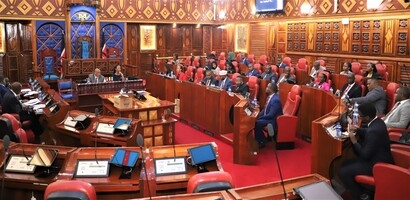The Council of Governors (CoG) has opposed a petition filed in Senate to block County Governments from outsourcing legal services, noting that there has been a significant reduction in the same due to enhanced capacity in legal departments in Counties.
The petitioner in his submission, accused Counties of paying billions in legal fees to external lawyers despite having fully established legal departments within the devolved units.
Appearing before the joint Senate Standing Committee on Devolution and Intergovernmental Relations together with the Senate Committee on Justice, Legal Affairs and Human Rights, Governors led by the CoG vice chair H.E Ahmed Abdullahi said that there are certain factors that necessitate hiring of external lawyers.
“Whereas county attorneys are competent and qualified legal professionals, cases affecting County Governments may require specialized experts in various fields. Notably, other institutions, including the Senate, have also hired external lawyers for technical matters,” said H.E. Ahmed Abdullahi.
“I want senators to think about what could happen if this house was barred from outsourcing highly qualified lawyers for a matter in court concerning them,” added the Wajir Governor.
Giving his remarks, Bungoma Governor H.E. Kenneth Lusaka emphasized the need to engage the Salaries and Remuneration Commission (SRC) to address the issue of disparity in pay for County Attorneys in comparison to their counterparts in other public offices. Further, the Advocates Remuneration Order sets limits on legal fees, which should guide the remuneration process for external lawyers on a case by case basis.
CoG CEO Mary Mwiti on her part highlighted that counties only hire external lawyers on need basis and in dire situations where County Governments need slot deposit pulsa specific expertise on legal issues.
Senators urged County Governments to outsource external legal services in good faith and undertake due process including seeking for quotations and negotiating with the law firms to get the most favourable fee notes.
Governors Oppose Bid to Bar County Governments from Outsourcing Legal Services






